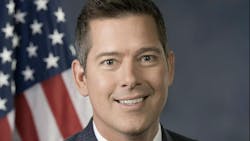UPDATED: Top takeaways from Sean Duffy’s nomination hearing for secretary of USDOT
UPDATED Jan. 23: The Senate Committee on Commerce, Science and Transportation unanimously voted to advance Sean Duffy's nomination for secretary of the U.S. Department of Transportation. His nomination advanced out of committee with 28 yeas and zero nays.
If confirmed, Duffy will lead a department with over 55,000 employees and will be tasked to tackle transportation projects and issues in a nonpartisan manner. He will also be responsible for getting awarded funding out the door from the Infrastructure Investment and Jobs Act, which is currently on pause per an executive order President Donald Trump issued at the start of this week.
In his remarks regarding Duffy's nomination, Committee Chair Sen. Ted Cruz (R-TX) highlighted the shortage of air traffic controllers and emerging technologies such as autonomous vehicles, saying Duffy "is prepared to meet these challenges" and will "work with both sides of the aisle" to confront these challenges.
"He knows what American families face in their daily lives and how important safety is to them. In many ways, he embodies the ‘revolution of common sense’ the President has called for. I hope we can agree Mr. Duffy is the kind of consensus-driven leader we need to oversee the Department of Transportation, and I strongly urge my colleagues to support his nomination,” Cruz said.
Jan. 16, 2025
Sean Duffy’s nomination hearing to become the next secretary of the U.S. Department of Transportation (USDOT) was a relatively low-drama affair. Numerous senators, including ones from his home state, as well as Commerce, Science and Transportation Committee Chair Sen. Ted Cruz (R-TX), expressed their strong support for him to take on the role.
While multiple senators from diverse states asked for commitments related to Amtrak, public transit overall received little attention in the spotlight compared to ports, aviation, and electric vehicles and auto manufacturing during his three-hour hearing.
“Trump is a builder and wants to rebuild infrastructure. He asked me to focus on big, durable projects that connect our country and people. If confirmed, I will work to reduce the red tape that slows critical infrastructure projects, ensuring funds are spent efficiently,” Duffy stated in his opening remarks.
In addition to speeding up project delivery, a key theme throughout Duffy’s responses focused on safety—whether that is making roads safer from distracted driving, creating safer working environments for highway workers or ensuring Americans feel safe taking an airplane.
“Safety is always paramount,” Duffy said in his opening remarks, adding that “we will craft clear regulations that balance safety, innovation and cutting-edge technology.”
Ensuring bipartisanship and implementing IIJA committed funding
Sen. Brian Schatz (D-HI) emphasized the importance of keeping transportation policy nonpartisan, urging Duffy to maintain a bipartisan approach. Duffy agreed, stating safety and infrastructure projects are not partisan issues and committing to bipartisan collaboration.
Sen. Maria Cantwell (D-WA) raised concerns about transparency and document requests, as well as potential negative impacts of Project 2025 on consumer protections and safety. Duffy said he was unfamiliar with Project 2025, but that he is committed to transparency and adhering to the President elect’s policy direction.
Multiple senators also wanted assurances from Duffy that he will implement funding that has already been committed from the Infrastructure Investment and Jobs Act (IIJA), emphasizing the bipartisanship of the IIJA. Sen. Tammy Duckworth (D-IL) stressed the importance of issuing funding without delays. Duffy confirmed he believes he will follow through on these commitments, stating that “if the projects are going well and the deal is being met,” then he has no issue with that.
Understanding the importance of public transit
Public transit did get some time in the spotlight, with projects such as Brightline West, the California High-Speed Rail project, Sound Transit, the Gateway Development Commission and New Jersey Transit (NJ Transit) getting mentioned.
In response to Duffy’s opening remarks regarding investing in big infrastructure projects, Sen. Andy Kim (D-NJ) underscored the critical nature of the Gateway Development Project, adding that the critical mega project is well underway and will require continued federal support. Duffy said he wants to examine the funding that has already gone out but he “imagines good projects that are underway we would continue [to support].”
Sen. Kim also highlighted the “problems” with NJ Transit, recalling the extensive delays from over the summer. Sen. Kim pointed out this is not just about working with the agency on the state side, but that it will require a federal partner. Duffy agreed to support ongoing projects and work with urgency to address delays and infrastructure challenges.
While Sen. Cruz expressed concerns over lack of transparency in USDOT staff ratings of the high-speed rail project, which Duffy committed to sharing, Sen. Cantwell highlighted the importance of accessible public transit. Sen. Lisa Blunt Rochester (D-DE) further emphasized the importance of improving access to rural transit.
“From my point, I do think rural communities can be forgotten,” Duffy said in response to Sen. Blunt Rochester’s question regarding supporting rural transit. “One of the balances is the amount of dollars it costs to connect through rail or other forms of transportation, but I want to figure out pathways to make sure our communities get connected to the arteries.”
Sen. John Curtis (R-UT) advocated for rewarding proactive state planning, highlighting Utah's passenger rail project and the upcoming Winter Olympics in 2026. Duffy affirmed his support for these initiatives, including the needed dual-track development and showcasing Utah’s transportation advancements.
Sen. Duckworth emphasized transportation access for individuals with disabilities and the importance of the All Stations Accessibility Program (ASAP) Act. Duffy committed to improving accessibility and following congressional directives, saying he will “work to improve transportation accessibility for all disabilities.”
Finally, Sen. Schatz addressed the rising pedestrian fatalities and the need for balanced transportation planning. Duffy expressed agreement and support for enhancing safety for pedestrians, cyclists and other modes of transit
Supporting Amtrak service
Senators highlighted Amtrak’s vital role in passenger rail across the country and the importance of continued funding.
Sen. Blunt Rochester emphasized the value of supporting Amtrak while Sen. Kim expressed concerns about potential funding cuts and stressed the need for nationwide representation in rail services.
Duffy acknowledged he hadn’t supported Amtrak funding while in serving in Congress because his district at the time did not receive any type of service, but added “this committee has spoken loudly about Amtrak and rail in home communities, so I will continue to abide by the law.”
Sen. Jerry Moran (R-KS) highlighted the Amtrak Southwest Chief's significance and the need to extend passenger rail service to rural areas. Duffy agreed on the importance of maintaining and expanding rural rail connections. Sen. Roger Wicker (R-MS) invited Duffy to visit Mississippi for the reopening of Amtrak’s Gulf Coast service. Duffy agreed on the importance of improving passenger rail.
“I want to commend the amount of effort you’ve put in. I would love to come see you for this project after a long delay is launched,” Duffy said in response to Sen. Wicker.
What’s next
At the conclusion of the hearing, Sen. Cruz added to the record Duffy had received 44 letters of support for his nomination from various industry associations and organizations. Senators now have until end of day Jan. 16 to submit questions for the record, and Duffy has until Jan. 19 to provide responses.
When asked about the legacy he hopes to leave behind if confirmed, Duff stated he hopes to leave a “legacy of improving safety and building big infrastructure projects that connect this country without forgetting about rural America.”
About the Author
Megan Perrero
Editor in Chief
Megan Perrero is a national award-winning B2B journalist and lover of all things transit. Currently, she is the Editor in Chief of Mass Transit magazine, where she develops and leads a multi-channel editorial strategy while reporting on the North American public transit industry.
Prior to her position with Mass Transit, Perrero was the senior communications and external relations specialist for the Shared-Use Mobility Center, where she was responsible for helping develop internal/external communications, plan the National Shared Mobility Summit and manage brand strategy and marketing campaigns.
Perrero serves as the board vice president for LIT and is a member of the American Public Transportation Association Marketing and Communications Committee. She holds a bachelor’s degree in multimedia journalism with a concentration in magazine writing and a minor in public relations from Columbia College Chicago.

